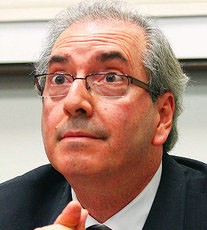BRASILIA, (Reuters) – The speaker of Brazil’s lower house of Congress broke with the government of President Dilma Rousseff yesterday over corruption accusations, deepening a political crisis in Latin America’s largest economy.
Speaker Eduardo Cunha accused Rousseff’s government and prosecutor general Rodrigo Janot of conspiring to incriminate him in a corruption scandal at state-run oil firm Petrobras in which he is being investigated for allegedly taking bribes.

“I cannot accept that the government uses its machinery to seek the political persecution of those who turn against it,” Cunha told journalists in Brasilia.
Cunha said he would push to remove his Brazilian Democratic Movement Party, or PMDB, from a governing alliance at a party congress in September.
The PMDB is Brazil’s largest party, and its departure from the governing coalition would deprive Rousseff and her allies of a majority in Congress. The party said in a statement it respected Cunha’s personal position but that any party decision would only be taken after consulting various party commissions.
The rupture, which has been in the works for months, comes a day after Cunha said he is weighing legal arguments for Rousseff’s impeachment over alleged campaign finance irregularities. Cunha is seen as a possible presidential candidate in 2018.
Soon after his comments yesterday, President Rousseff told regional peers at a conference that there is no room for “anti-democratic adventures” in South America. Her allies have compared impeachment efforts against her to a coup.
Some opposition lawmakers are leading the calls for Rousseff’s impeachment but Cunha, as speaker of the lower house, would be responsible for initiating the process.
His opposition to Rousseff could pose a major obstacle to any government-proposed legislation, complicating her efforts to shore up public finances and avert a credit-rating downgrade.
Brazil’s currency and the benchmark Bovespa index stock fell over 1 percent after Cunha’s comments.
Finance Minister Joaquim Levy, who is struggling to push Rousseff’s austerity programme through Congress, said the speaker of the lower house is expected to have an impartial role.
“I’m sure that, in fulfilling his duties, he will remain the same,” he told reporters in Brasilia.
A statement from Rousseff’s office said Cunha’s decision was “strictly personal” and should not affect his role as speaker, adding that the government had not meddled with investigations.
Cunha’s departure from Rousseff’s coalition was triggered by testimony from lobbyist Julio Camargo, who said Cunha had taken $5 million in bribes stemming from drillship contracts. Cunha denied the allegations and said Camargo had been pressured to change his prior story.
Cunha and Rousseff were never friendly, even before he defeated her candidate to become house speaker, but he often cooperated on key legislation and opposed earlier calls for impeachment despite the president’s record-low popularity.
Their relationship has deteriorated further since March, when Cunha’s name appeared on a list with dozens of lawmakers under investigation for allegedly receiving bribes from funds skimmed off overpriced Petrobras contracts. Formal charges against lawmakers are expected in coming months. Cunha told reporters he would remain responsible in his role as house speaker.
“I’m not reckless with public accounts. I don’t think you have to set fire to the country because there is a political fight,” he said.
Still, Cunha’s standoff with the president is likely to hang over the upcoming two-week recess from Congress.
“This will be the busiest recess in Brasilia’s history,” said Lucas de Aragao, a political analyst at risk consultancy Arko Advice. “We’ll have to see over the next 10 to 15 days how lawmakers in the PMDB and other parties will react, to see who stays and who goes.”




